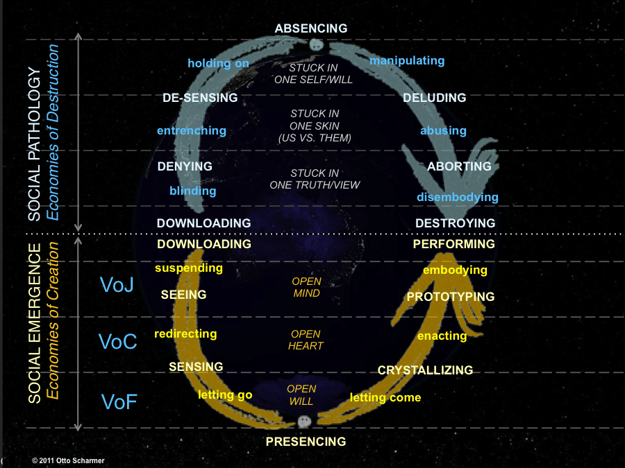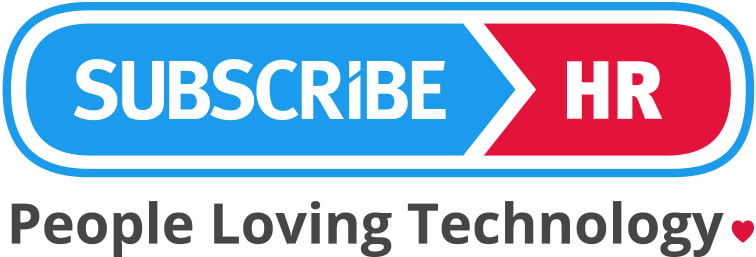It has been said that problems can not be solved from the same level of awareness or mindset from which they were created. One doesn't have to look very far to realise that humanity currently faces a lot of problems. Whilst this may have always been the case, and whilst it is also true that humans have become adept at solving some very complex problems, it is also fair to say that we are potentially facing one of the biggest 'problems' in modern history. What these problems require of us, is a new approach to leadership and a new level of awareness about how we can transform current issues into future possible solutions to navigate the future of work.
The Future of Leadership: Tapping Our Collective Human Capacity To Transform
We live in a time of massive institutional failure, collectively creating and repeating results that nobody wants. Climate change. AIDS. Hunger. Poverty. Violence. Terrorism. Destruction of communities, nature, life—the foundations of our social, economic, ecological, and spiritual well-being are under significant threat. This current moment in history calls for a new level of awareness and a new collective leadership capacity to meet challenges in a more conscious, intentional, and strategic way. The development of such a capacity would allow us to create a future of greater possibilities, as opposed to just repeating the status quo.
Illuminating the Current and Historical Blind Spot
It is important to ask ourselves why our attempts to deal with the challenges of our time fail so frequently? Why do we find ourselves going around in circles like a broken record, repeating the same old patterns that lead to situations that the collective don't want? The cause of our collective failure is that we are blind to the deeper dimensions of leadership and transformational change. This 'blind spot' exists not only in the sphere of collective leadership, but also in our everyday social interactions. Many of us are blind to the source dimension from which effective leadership and social action are able to come into being. We know a great deal about what leaders do and how they do it. But we know very little about the inner place, the source from which they operate. And it is this source that 'Theory U' attempts to explore.
Theory U: One Process, Five Movements
According to Otto Scharmer, in his book Theory U, when leaders develop the capacity to come near to that 'source,' they experience the future as if it were 'wanting to be born'— an experience called 'presencing.' That experience often carries with it ideas for meeting current and future challenges and for bringing into being an otherwise impossible future. Theory U shows how that capacity for presencing can be developed. Presencing is a journey with five movements, outlined below.
As the diagram illustrates, we move down one side of the U (connecting us to the world that is outside of our institutional bubble) to the bottom of the U (connecting us to the world that emerges from within) and up the other side of the U (bringing forth the new into the world).
On that journey, at the bottom of the U, lies an inner gate that requires us to drop everything that isn’t essential. This process of letting-go (of our old ego and self) and letting-come (our highest future possibility: our Self) establishes a subtle connection to a deeper source of knowing. The essence of presencing is that these two selves—our current self and our best future Self—meet at the bottom of the U and begin to listen and resonate with each other.
Once an individual or group crosses this threshold, nothing remains the same. Individual members and the group as a whole begin to operate with a heightened level of energy and sense of future possibility. Often they then begin to function as an intentional vehicle for an emerging future.
Some of you reading this might feel that this theory sounds a little esoteric, or left of centre, however, Theory U has developed out of a rigorous and dedicated study of leadership at MIT and The Sloane School of Management - both serious academic institutions with sterling reputations. In fact, MIT is currently running free a MOOC called 'U.Lab: Transforming Business, Society and Self' that has attracted 45,000 participants globally.

There are seven Theory U Leadership capacities and the journey through the 'U' develops seven essential leadership capacities.
- Holding the space of listening - The foundational capacity of the U is listening. Listening to others. Listening to oneself. And listening to what emerges from the collective. Effective listening requires the creation of open space in which others can contribute to the whole. The human being was made with two ears and one mouth - the implication being that our very form indicates that we should listen more than we speak, yet how many of us actually do this?
- Observing - The capacity to suspend the 'voice of judgment' is key to moving from projection to true observation. When was the last time you went to a meeting, or went and sat in out in the world, and simply observed what was going on around you?
- Sensing - The preparation for the experience at the bottom of the U - presencing - requires the tuning of three instruments: the open mind, the open heart, and the open will. This opening process is not passive but an active 'sensing' together as a group. While an open heart allows us to see a situation from the whole, the open will enables us to begin to act from the emerging whole. How many of you even think about bringing something beyond your mind to the table when doing business?
- Presencing - The capacity to connect to the deepest source of self that will allow the future to emerge from the whole rather than from a smaller part or special interest group. How many of you know the difference between the 'self' and the 'Self'?
- Crystallising - When a small group of key people commits itself to the purpose and outcomes of a project, the power of their intention creates an energy field that attracts people, opportunities, and resources that make things happen. This core group functions as a vehicle for the whole to manifest. How many of you conduct your business affairs with an awareness about the energy field that your team or organisation creates?
- Prototyping - Moving down the left side of the U requires the group to open up and deal with the resistance of thought, emotion, and will; moving up the right side requires the integration of thinking, feeling, and will in the context of practical applications and learning by doing. How integrated is your organisation's approach to doing business - do your employees engage thinking, feeling and will consciously?
- Performing - A prominent violinist once said that he couldn’t simply play his violin in Chartres cathedral; he had to 'play' the entire space, what he called the 'macro violin,' in order to do justice to both the space and the music. Likewise, organisations need to perform at this macro level: they need to convene the right sets of players (frontline people who are connected through the same value chain) and to engage a social technology that allows a multi-stakeholder gathering to shift from debating about the past and the present, to co-creating the new.
Theory U Encourages You to Step into the Emerging Future
Theory U is a framework and a process that challenges your beliefs on mutiple levels and challenges each of us to pause for some deep self-reflection. MIT x U.Lab's MOOC 'Transforming Business, Society and Self' provides the opportunity to participate in a global, well organised, well structured, well supported and inspiring experience surrounded by tens of thusands of others committed to transforming the way we lead and create change.
Examples of the above seven Theory U leadership capacities can be found in a number of multi-stakeholder innovations and corporate applications across the globe. The Presencing Institute is dedicated to developing these new social technologies by integrating science, consciousness, and profound social change methodologies that can be applied in multiple contexts, including the workplace.
For those of you reading about 'Theory U' and the potential for 'Leading From the Emerging Future,' for the first time, we encourage you to explore these frameworks further by clicking on each of the links above.

